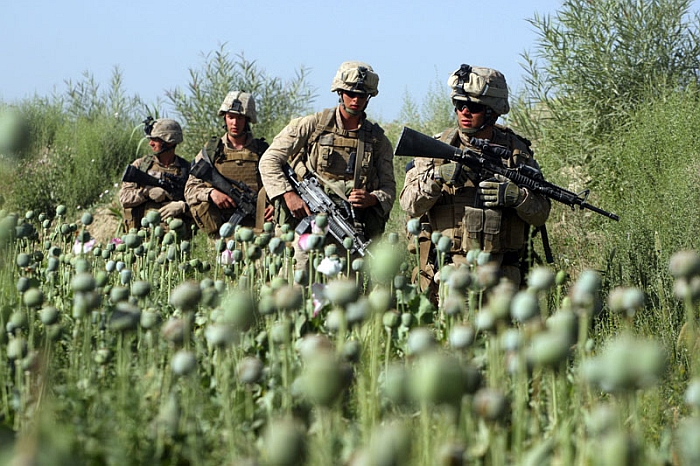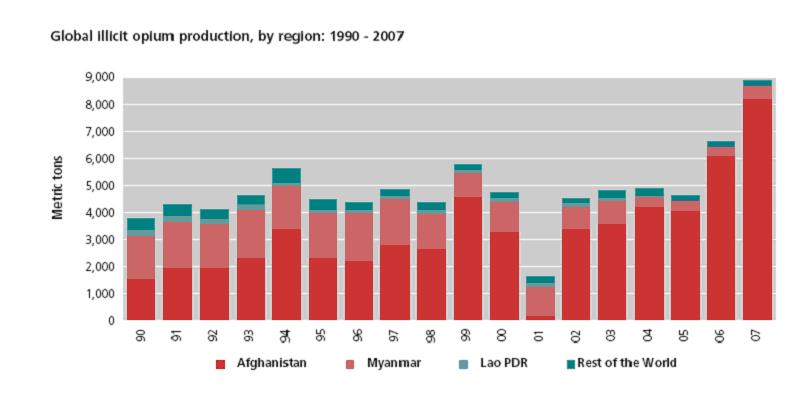"No blood for opium": The Afgan War's hidden agenda is to protect the drug trade
Dr. John Jiggens | 22.04.2010 19:59 | Analysis | Anti-militarism | Globalisation | World


The Afghan War: "No Blood for Opium"
The Hidden Military Agenda is to Protect the Drug Trade
by Dr. John Jiggens, 21 April 2010
It was common during the opening of the Iraq war to see slogans proclaiming “No blood for oil!” The cover story for the war – Saddam’s links with Al Qaida and his weapons of mass destruction – were obvious mass deceptions, hiding a far less palatable imperial agenda. The truth was that Iraq was a major producer of oil and, in our age, the Age of Oil, oil is the most strategic resource of all. For many it was obvious that the real agenda of the war was an imperialistic grab for Iraqi oil. This was confirmed when Iraq’s state-owned oil company was privatised to western interests in the aftermath of the invasion.
Why then are there no slogans saying “No blood for opium!”? Afghanistan’s major product is opium and opium production has increased remarkably during the present war. The current NATO action around Marjah is clearly motivated by opium. It is reported to be Afghanistan’s main opium-producing area. Why then won’t people consider that the real agenda of the Afghan war has been control of the opium trade?
The weapons of mass deception tell us that the opium belongs to the Taliban and that the US is fighting a war on drugs as well as terror. Yet it remains a curious fact that the opium trade has tracked across Southern Asia for the past five decades from east to west, following US wars, and always under the control of US assets.
In the 1960s, when the US fought a secret war in Laos using the Hmong opium army of Vang Pao as its proxy, Southeast Asia produced 70% of the world’s illicit opium. After the Soviet invasion of Afghanistan, Afghanistan production, controlled by US-backed drug lords, took off, till it rivalled Southeast Asian production. Since 2002, Afghan opium production, encouraged by both the Taliban and US-backed drug lords, has reached 93% of world illicit production, an unparalleled performance.
The graph below from the UN World Drug Report 2008 shows the astonishing increase in Afghan opium production that followed the US invasion.
In the 1980s the US supported Islamic fundamentalists, the Mujahideen, against the Soviets in Afghanistan. To pay for their war, the Mujahideen ordered peasants to grow opium as a revolutionary tax. Across the border in Pakistan, Afghan leaders and local syndicates, under the protection of Pakistani Intelligence, operated hundreds of heroin labs. As the Golden Crescent in Southwest Asia eclipsed the Golden Triangle in Southeast Asia as the centre of the heroin trade, it sent rates of addiction spiralling in Afghanistan, Iran, Pakistan and the Soviet Union.
To hide US complicity in the drug trade, Drug Enforcement Agency (DEA) officers were required to look away from the drug-dealing intrigues of the US allies and the support they received from Pakistan’s Inter Service Intelligence (ISI) and the services of Pakistani banks. The CIA’s mission was to destabilise the Soviet Union through the promotion of militant Islam inside the Central Asian Republics and they sacrificed the drug war to fight the Cold War. Their mission was to do as much damage as possible to the Soviets. Knowing the drug war would hasten the collapse of the Soviet Union, the CIA facilitated the operation of anti-Soviet rebels in the provinces of Uzbekistan, Chechnya and Georgia. Drugs were used to finance terrorism and western intelligence agencies used their control of drugs to influence political factions in Central Asia.
The Soviet army withdrew from Afghanistan in 1989, leaving a civil war between the US-funded mujahideen and the Soviet-supported government that raged until 1992. In the chaos that followed the mujahideen victory, Afghanistan lapsed into a period of warlordism in which opium growing thrived.
The Taliban emerged from the chaos, dedicated to removing the war lords and applying a strict interpretation of Sharia law. They captured Kandahar in 1994, and expanded their control throughout Afghanistan, capturing Kabul in 1996, and declaring the Islamic Emirate of Afghanistan.
Under the policies of the Taliban government, opium production in Afghanistan was curbed. In September 1999, the Taliban authorities issued a decree, requiring all opium-growers in Afghanistan to reduce output by one-third. A second decree, issued in July 2000, required farmers to completely stop opium cultivation. Ordering the ban on opium growing, Taliban leader Mullah Omar called the drug trade “un-Islamic”.
As a result, 2001 was the worst year for global opium production in the period between 1990 and 2007. During the 1990s, global opium production averaged over 4000 tonnes. In 2001, opium production fell to less than 200 tonnes. Although it was not admitted by the Howard government, which claimed the credit itself, Australia’s 2001 heroin shortage was due to the Taliban.
Following the attack on the Pentagon and the World Trade Centre on 11 September 2001, the armies of the northern alliance, led by US Special Forces, supported by daisy cutters, cluster bombs and bunker-busting missiles, shattered the Taliban forces in Afghanistan. The opium ban was lifted and, with CIA-backed warlords back in control, Afghanistan again became the major producer of opium. Despite the official denials, Hillary Mann Leverett, a former US National Security Council official for Afghanistan, confirmed that the US knew that government ministers in Afghanistan, including the minister of defence in 2002, were involved in drug trafficking.
After 2002 Afghan opium production rose to unheard of levels. By 2007, Afghanistan was producing enough heroin to supply the entire world. In 2009, Thomas Schweich, who served as US state department co-ordinator for counter-narcotics and justice reform for Afghanistan, accused President Hamid Karzai of impeding the war on drugs. Schweich also accused the Pentagon of obstructing attempts to get military forces to assist and protect opium crop eradication drives.
Schweich wrote in the New York Times that "narco-corruption went to the top of the Afghan government". He said Karzai was reluctant to move against big drug lords in his political power base in the south, where most of the country's opium and heroin is produced.
The most prominent of these suspected drug lords was Ahmed Wali Karzai, the brother of President Hamid Karzai. Ahmed Wali Karzai was said to have orchestrated the manufacture of hundreds of thousands of phony ballots for his brother’s re-election effort in August 2009. He was also believed to have been responsible for setting up dozens of so-called ghost polling stations — existing only on paper — that were used to manufacture tens of thousands of phony ballots. US officials have criticised his “mafia-like” control of southern Afghanistan. The New York Times reported that the Obama administration had vowed to crack down on the drug lords who permeate the highest levels of President Karzai’s administration, and they pressed President Karzai to move his brother out of southern Afghanistan, but he refused to do so.
"Karzai was playing us like a fiddle," Schweich wrote. "The US would spend billions of dollars on infrastructure development; the US and its allies would fight the Taliban; Karzai's friends could get richer off the drug trade. Karzai had Taliban enemies who profited from drugs but he had even more supporters who did."
But who was playing who like a fiddle?
Was it the puppet President or the puppet masters who installed him?
As Douglas Valentine shows in his history of the War on Drugs, The Strength of the Pack, this never-ending war has been a phony contest, an arm wrestle between two arms of the US state, the DEA and the CIA; with the DEA vainly attempting to prosecute the war, while the CIA protects its drug-dealing assets.
During the Nineteenth and Twentieth centuries, European powers (chiefly the UK) and Japan used the opium trade to weaken and subjugate China. During the Twenty-First century, it seems that the opium weapon is being used against Iran, Russia and the former Soviet republics, which all face spiralling rate of addiction and covert US penetration as the Afghan War fuels central Asia’s heroin plague.
* Dr John Jiggens is the author of “The killer cop and the murder of Donald Mackay”.
Dr. John Jiggens
 Homepage:
http://www.globalresearch.ca/index.php?context=va&aid=18768
Homepage:
http://www.globalresearch.ca/index.php?context=va&aid=18768
Comments
Display the following 4 comments